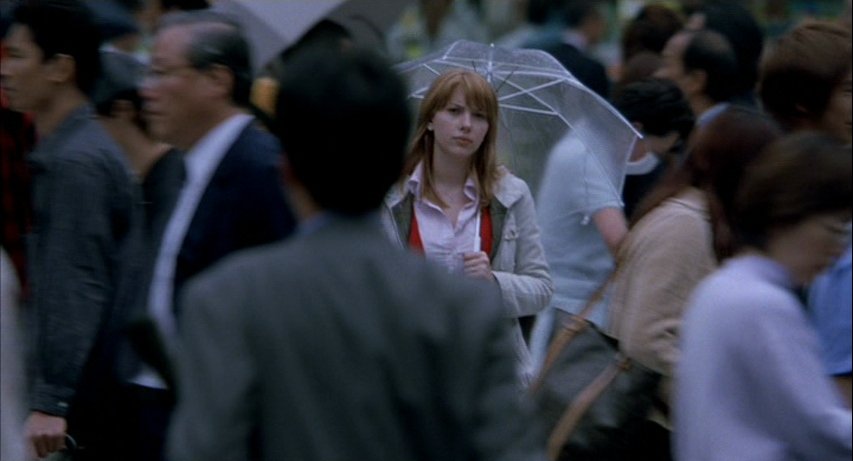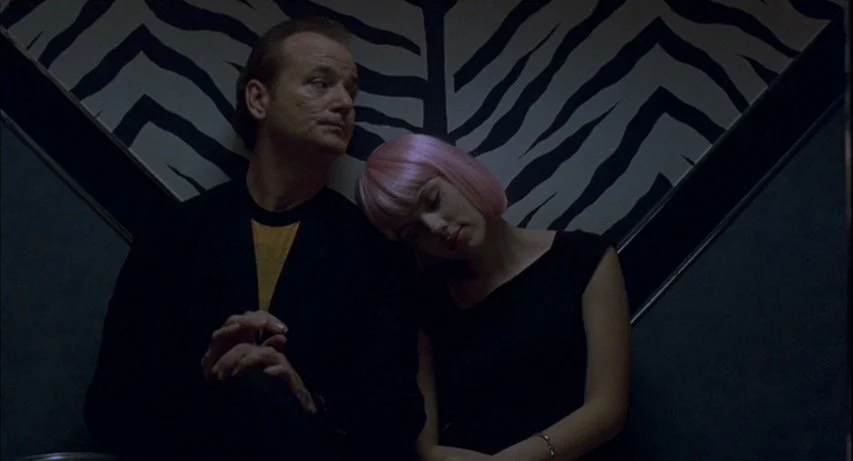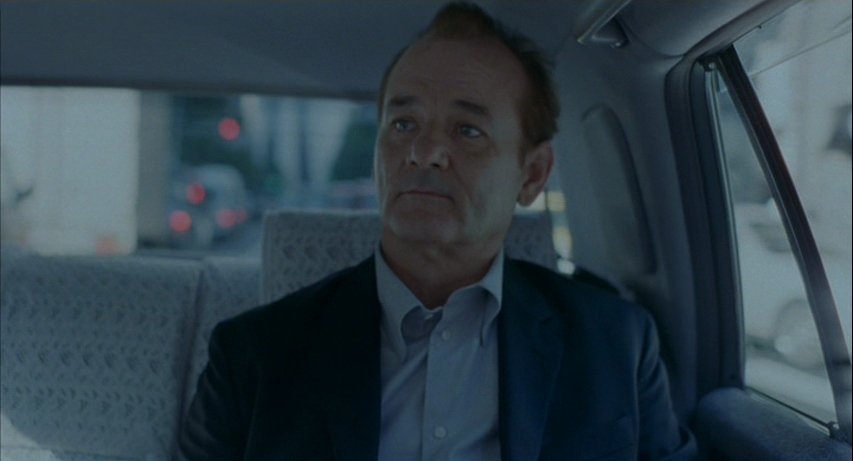Lost in Translation Script Analysis: Looking for Connection
Sofia Coppola has described her film Lost in Translation as being a story about “things being disconnected and looking for connection”. Whether it be a disconnection from your partner, a disconnection from your family, or a disconnection from the world at large, this film truly encapsulates these feelings and emphasizes the significance of encountering someone who can relate. While a fairly simple story in nature, Coppola masterfully illuminates these complex emotions through well-developed characters, significant dialogue, and a beautiful setting. As a result, she created an Academy Award-winning film that feels melancholic, relatable, and heartbreaking all at the same time.
OPENING IMAGE
The film opens with a shot of a woman wearing pink underwear lying down in a Tokyo hotel bedroom. A simple introduction to the film, but within its simplicity lies feelings of loneliness, solitude, and insignificance in a larger world.
SET UP
Next, we are introduced to Bob Harris, a washed-up movie star in Japan for business.
Although not explicitly stated, the audience can infer these traits from the opening shot of him alone. His tired and unsatisfied look as he glances out the window and sees his face on a billboard shows us that, despite his obvious success, he is still unhappy.
He arrives at his hotel room, where he’s greeted with a fax from his wife:
Not only is he unsatisfied with his career, but he’s also having problems at home. Not wanting to focus too much on all the negatives, he goes about several thoughtless tasks to simply pass the time: drinking alone at the bar, watching TV in his room, and attempting to find comfort in a hot shower built for people much shorter than he is. Not quite the getaway he was hoping for.
The next day, we discover why Bob is in Tokyo in the first place: he’s getting paid to shoot a commercial for a luxury whiskey brand, Suntory. While not artistically fulfilling, at least he’s getting paid.
Back at the hotel, Bob goes about the same thoughtless tasks as before. But this time, each one is interrupted. Fans of his attempt to start up a conversation with him at the bar (to which he gets up and leaves) and a hooker is waiting for him inside his hotel room (whom he desperately tries to remove). The message is clear: Bob just wants to be left alone. He’s disconnected, and he intends to keep it that way.
Later that night, we are introduced to Charlotte, a pretty, young, Ivy League woman who’s accompanying her celebrity photographer husband, John, on a work trip. He’s constantly busy, and as a result, often abandons Charlotte in the confines of their hotel room.
As they lay together in bed, Charlotte, unable to sleep, attempts to wake her husband up to talk about something.
It’s clear that, like Bob, she too is unsatisfied.
The next day, while once again left alone, Charlotte decides to explore Tokyo. Despite it being a bright and lively culture filled with friendly people, she can’t help but feel alone.
INCITING INCIDENT
One late night, when both Bob and Charlotte’s lonely antics happened to occur at the same time, they find themselves sitting next to each other at the hotel bar. Politely, Charlotte strikes up a conversation. It’s unclear whether or not she knows who he is.
While nothing significant occurs during their interaction, their mutual recognition of the other’s loneliness sparks an attraction between them, and as a result, sets in motion the relationship between them that is soon to come.
DEBATE
Charlotte continues to struggle with her place in the world. She lies awake in her hotel room, late at night, listening to self-help books on audiotape and taking career-centered magazine quizzes. All she really has is John, who’s almost never around.
When John finally does return to the hotel, he’s approached by a young movie star named Kelly. She knows him from past photoshoots and invites them out for drinks. Right away, it’s clear that Charlotte hates this woman. Not necessarily because of how ignorant she is, but because her presence makes her feel invisible in front of her husband. Stuck between sitting alone in the hotel again or hanging out with Kelly and John, Charlotte’s forced to tough it up and chooses the latter. Naturally, it’s torture for her.
Right away, Bob has become her escape. Once again, they don’t talk much, but their moments together are significant.
BREAK INTO TWO
John once again leaves for work, this time for many days. While he’s gone, Charlotte happens to pass Bob near the hotel pool.
This invitation sparks a significant shift in Bob and Charlotte’s relationship. No longer will they simply be a pleasant surprise to one another as they pass each other in the hotel bar. They have begun to actively seek each other out. Two people, disconnected, are finally looking for connection.
FUN AND GAMES
Bob arrives at Charlotte’s hotel room to pick her up for their fun night out.
Immediately, she knows that he’s a genuine guy: no judgment, no games, just someone who’s willing to understand.
They proceed to go out and party in Tokyo with Charlotte’s friends. They drink, sing karaoke, dance, and just have a good time. Charlotte’s able to not feel so alone, and Bob’s able to feel young again. Just what they both needed in this moment.
On the cab ride home, the reality of the night ending sets in.
MIDPOINT
The midpoint of the script finds both characters struggling internally with the reality of their lives. Bob is very obviously falling for Charlotte, but he’s a much older married man with children. He calls his wife after the night out in Tokyo, hoping to mimic even a fraction of the passion he felt just hours before.
The next night, Charlotte visits Bob in his hotel room, admitting to him that she feels stuck and is looking for a way out.
She proceeds to ask him about his marriage, hoping to relate to him in some way.
For the first time, they’re able to truly be vulnerable and intimate with one another. Right at the end of their shared time in Japan.
BAD TO WORSE
During a hot bath, Bob talks to his wife again on the phone. For the first time, it’s clear there’s some tension in their relationship (or it’s the first time he’s willing to acknowledge it).
Bob’s desperately looking for improvement in his life anywhere he can get it, but Lydia isn’t reciprocating. Just like he said, he’s lost. Back to disconnected.
That night, feeling especially lonely, Bob takes up a conversation with an American jazz singer at the bar. CUT TO:
Even though they’re both already in relationships, Charlotte feels betrayed. Something about Bob sleeping with the singer minimizes every experience they’ve had together so far. Were the moments actually significant, or was Bob just looking to spend time with anybody in an attempt to distract himself from his problems? Was what they had real, or was it just because Charlotte happened to be sitting next to him at the bar that one night? The thing about desperately seeking connection is that, sometimes, it doesn’t matter who it’s with. But when it comes to Bob’s connection with Charlotte, it did matter.
BREAK INTO THREE
During their final days in Japan, Charlotte and Bob grab lunch together. It’s clear that something’s off. Finally, Charlotte breaks the ice.
Their conversation escalates, and while it never reaches the point of being an argument, something about the way they’re speaking to each other now is almost worse. It’s filled with discomfort, phoniness, and all around a lack of interest. Everything special about their relationship is just gone. Back to disconnected.
FINALE
Later that night, a fire alarm goes off in the hotel, forcing everyone to evacuate. Bob throws on a robe and some slippers and moves outside, where he discovers Charlotte waiting in a corner.
Back to being connected.
During their last night together in Japan, they decide to grab drinks at the same hotel bar where they met days earlier. One last experience together, hoping to recreate the magic of days before.
But the night just ends. They both go back to their rooms, and go to sleep.
The next morning, just as he’s about to leave, Bob calls Charlotte’s room, hoping to see her just one last time. But when she gets down to the lobby, he can’t think of anything good to say. They keep having these opportunities to end on a beautiful note, but it just keeps not happening.
A disappointing conclusion, to say the least. She walks out the front door to take a walk around the city, and he gets in the limousine to head to the airport. Just like that, their relationship and time together in Japan have come to an end.
CLOSING IMAGE
As Bob’s limousine drives down the streets of Tokyo on the way to the airport, he notices Charlotte walking amongst a large crowd. He stops the car, hops out, and chases her down.
While not in the original script, the final film depicts Bob embracing Charlotte close and whispering something in her ear. Something significant that the audience can’t hear. Something for her to remember as their final moment together. Some people watch this film and become frustrated at the lack of clarity, but I absolutely love this decision by Coppola. For the past three days, the audience has been voyeuristically watching Bob and Charlotte’s relationship develop. It’s been personal, beautiful, and made us feel grateful that we were able to be a part of it. But right at the end, Coppola reminds us that this isn’t our moment, it’s theirs. Just two people sharing a single place in time, and it’s not our right to be a part of it.
With tears in their eyes, Bob and Charlotte say goodbye. He gleefully watches her turn and continue walking down the streets of Tokyo before getting back in his limousine. The fantasy is over, and it’s back to the real world for both of them. Despite this, they’re both going back to their lives as changed people, forever grateful for those three lonely days in Tokyo that weren’t so lonely after all.
WHY IT’S EXCELLENT
As I mentioned before, this film is amazing for its depiction of the natural human desire to find connection. As people, we crave connection at every turn of life: at work, through friends, and, of course, romantically. Charlotte, being a young character who jumped into a marriage too quickly, represents our tendency to try to force connections with people who just aren’t right for us. Bob, being an older man who has gone through multiple marriages (and is currently in an unhappy one), represents our consistent attempts to get it right even after failure. When these two characters collide and fill the gaps in one another (but can’t be together due to their personal circumstances), it highlights the fact that there are countless other variables at play. Still, their relationship serves as a reminder to enjoy the wonderful moments you have with people without overanalyzing how you’ll move on together in the future. Not everything has to be permanent. Sometimes, the most significant connections can develop in a matter of days.














































